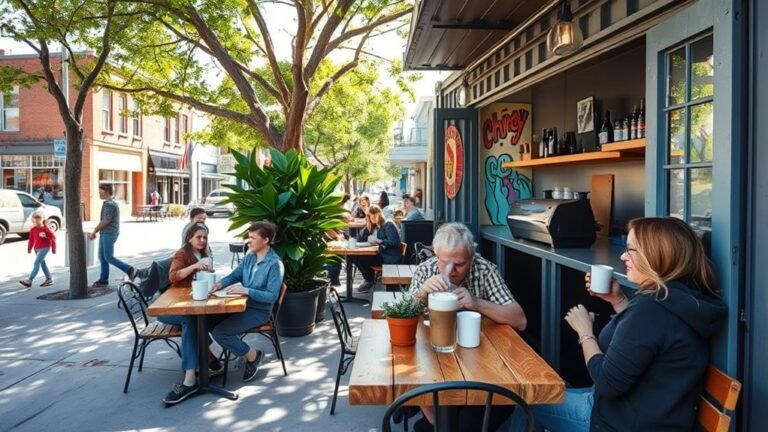The Role of Fair Trade in the Coffee Industry
You’ll find that Fair Trade in the coffee industry guarantees farmers get stable, fair wages by assuring minimum prices and premiums, supporting community development and improving working conditions. It promotes sustainable farming, which boosts coffee quality and reduces environmental impact. Certification adds transparency and market access, though challenges like market volatility persist. Consumer demand is rising steadily, fueling growth and innovation. Understanding these factors offers deeper insight into Fair Trade’s critical role in coffee production.
Understanding the Principles of Fair Trade

Although you might be familiar with the term, understanding the principles of Fair Trade requires examining its core criteria: fair pricing, labor rights, environmental sustainability, and community development. Fair trade principles guarantee producers receive stable, transparent prices that cover production costs and provide a living wage, safeguarding economic freedom. Labor rights focus on safe working conditions and prohibit child and forced labor, aligning with ethical consumption standards. Environmental sustainability mandates practices reducing harmful chemicals and conserving biodiversity, guaranteeing long-term ecological balance. Community development involves reinvesting premiums into education, healthcare, and infrastructure, empowering producers to improve their quality of life independently. By embracing these fair trade principles, you support a system that balances economic freedom with social and environmental responsibility, enabling you to consume ethically without compromising your values.
How Fair Trade Benefits Coffee Farmers
You’ll find that Fair Trade certification increases coffee farmers’ incomes by guaranteeing minimum prices and premiums for quality. This financial stability allows farmers to invest in their land and families, reducing vulnerability to market fluctuations. Additionally, Fair Trade funds support community development projects, improving local infrastructure and social services.
Improved Farmer Incomes
Increased income stability is one of the most measurable benefits that Fair Trade certification brings to coffee farmers. By ensuring price stability, you’re protected from volatile global coffee markets. This consistency supports income diversification, allowing you to invest in other revenue streams or savings. The Fair Trade minimum price acts as a financial safety net, reducing risks and enabling better planning.
| Metric | Fair Trade Farmers | Non-Fair Trade Farmers |
|---|---|---|
| Average Price per Pound | $1.40 | $1.00 |
| Price Stability Index | 85% | 60% |
| Income Diversification | 40% engage | 15% engage |
| Income Growth (3 years) | +18% | +5% |
| Financial Security | High | Moderate |
With Fair Trade, you gain financial freedom through predictable income and diversified opportunities.
Community Development Support
When coffee farmers participate in Fair Trade, they receive more than just better prices—they gain access to community development funds that directly support local projects. These funds enable you to invest in community initiatives such as building schools, improving healthcare facilities, and enhancing infrastructure. Data shows that over 60% of Fair Trade premiums are allocated to projects chosen democratically by farmers, fostering social empowerment and collective decision-making. By participating, you help create sustainable environments where your community can thrive independently. This model reduces reliance on external aid and promotes self-sufficiency. Fair Trade’s emphasis on transparency means you can track how funds are used, ensuring resources address your community’s specific needs. Ultimately, this approach supports both economic freedom and long-term social development for coffee-growing regions.
The Impact of Fair Trade on Coffee Quality
Although fair trade practices primarily aim to improve farmers’ livelihoods, they also have notable effects on coffee quality. By ensuring stable prices and investing in farmer training, fair trade enables producers to focus on meticulous cultivation and harvesting techniques. Data from multiple quality assessments reveal that fair trade-certified coffees often score higher in cupping tests, reflecting enhanced coffee flavor profiles, including increased acidity and complexity. You’ll find that these improvements are linked to better post-harvest processing, made possible through fair trade premiums funding infrastructure upgrades. While coffee quality depends on numerous variables, fair trade’s structured support reduces variability and incentivizes consistent quality. This means you’re more likely to experience a superior cup when choosing fair trade coffee, as farmers have both the means and motivation to optimize every stage of production.
Fair Trade and Environmental Sustainability
You’ll find that Fair Trade practices reduce the carbon footprint by encouraging energy-efficient methods and minimizing transportation emissions. Organic farming techniques promoted under Fair Trade standards limit chemical use, improving soil health and water quality. Additionally, these practices help protect biodiversity by preserving native habitats and supporting diverse ecosystems on coffee farms.
Reducing Carbon Footprint
Since the coffee industry contributes significantly to global greenhouse gas emissions, reducing its carbon footprint is essential for environmental sustainability. You can support fair trade practices that focus on:
- Implementing carbon offsetting initiatives that compensate for emissions through reforestation and renewable energy projects.
- Adopting sustainable packaging solutions to minimize plastic waste and lower overall environmental impact.
- Optimizing supply chains to reduce transportation-related emissions by sourcing locally or regionally.
- Encouraging energy-efficient processing methods within coffee cooperatives.
These measures collectively reduce carbon output, aligning with the freedom you seek to make responsible choices. Data shows that fair trade coffee farms adopting these strategies have cut emissions by up to 30%, proving that sustainability and profitability can coexist without compromising your values.
Promoting Organic Farming
When coffee farms switch to organic methods, they reduce their reliance on synthetic pesticides and fertilizers, which benefits both the environment and local communities. By obtaining organic certification, you guarantee that farming adheres to strict standards promoting soil health, water conservation, and reduced chemical runoff. Data shows organic coffee farms often use crop rotation and natural pest control, sustainable practices that enhance long-term land productivity. This not only supports ecological balance but also provides you with a product free from harmful residues. Fair Trade’s emphasis on organic certification aligns with your desire for transparency and environmental responsibility. Adopting these practices can increase resilience against climate variability, offering you a more stable livelihood while protecting natural resources without compromising your freedom to farm sustainably.
Protecting Biodiversity
Although protecting biodiversity may seem like a complex challenge, Fair Trade practices offer clear strategies to preserve the variety of plant and animal species within coffee-growing regions. When you support Fair Trade coffee, you contribute to biodiversity conservation and ecosystem protection through:
- Implementing shade-grown coffee techniques that maintain native tree cover, supporting wildlife habitats.
- Prohibiting harmful pesticides and promoting organic inputs, reducing chemical impact on soil and water.
- Enforcing land-use guidelines that prevent deforestation and preserve natural ecosystems.
- Encouraging farmer education on sustainable practices, enhancing long-term environmental stewardship.
These data-driven measures help maintain ecological balance and safeguard genetic diversity. By choosing Fair Trade, you exercise your freedom to support a coffee industry that values environmental integrity alongside economic fairness.
Challenges Faced by Fair Trade Coffee Producers

Fair Trade coffee producers face multiple challenges that can affect their profitability and sustainability. One significant issue is limited market access; despite growing consumer interest, many producers struggle to connect with stable, fair-paying buyers, restricting their sales potential. You also have to contend with pricing volatility in global coffee markets. Even with Fair Trade minimum prices, fluctuations in commodity coffee prices can create financial uncertainty, complicating long-term planning. Additionally, infrastructural deficits, such as poor transportation and storage facilities, increase costs and reduce product quality. These factors combined limit your ability to scale operations and invest in improvements, threatening both economic freedom and community resilience. Understanding these challenges is vital if you want to promote equitable growth and sustain your livelihood within the Fair Trade coffee sector.
The Role of Certification in Fair Trade Coffee
Since certification serves as the foundation for trust and transparency in the Fair Trade coffee market, understanding its role is essential for producers and buyers alike. Certification standards guarantee that coffee production adheres to strict criteria, promoting ethical sourcing and sustainable practices. When you engage with certified Fair Trade coffee, you benefit from:
- Verified compliance with social, economic, and environmental guidelines
- Assurance of fair wages and safe working conditions for farmers
- Transparent supply chains that prevent exploitation
- Access to premium markets supporting producer independence
These certification standards empower you to make informed choices, fostering a fairer coffee industry. By relying on certification, you contribute to a system that values producer autonomy and ethical trade, aligning with your desire for freedom in consumption and commerce.
Consumer Awareness and Demand for Fair Trade Coffee
Certification builds the foundation for ethical coffee sourcing, but consumer awareness ultimately drives demand for these products. Your understanding of fair trade principles is shaped by consumer education, which influences purchasing decisions and market trends. As more consumers prioritize ethical choices, demand for fair trade coffee grows, creating a positive feedback loop.
| Year | Consumer Awareness (%) | Fair Trade Coffee Sales (Million $) |
|---|---|---|
| 2018 | 45 | 250 |
| 2019 | 52 | 310 |
| 2020 | 60 | 400 |
| 2021 | 68 | 470 |
| 2022 | 75 | 530 |
Fair Trade Coffee in the Global Market

Although global coffee consumption continues to rise, fair trade coffee accounts for a growing yet still modest share of the international market. You’ll find that fair trade’s presence hinges on several factors:
Fair trade coffee grows steadily but remains a modest part of the expanding global coffee market.
- Certification processes that guarantee ethical sourcing and transparency in supply chains.
- Market dynamics shaped by trade agreements that impact market access.
- Pricing strategies balancing fair compensation with competitive pricing.
- Consumer preferences increasingly favoring sustainably sourced products.
Navigating the competitive landscape means understanding these elements. Fair trade coffee’s market share reflects both opportunities and constraints within global trade. As a consumer or stakeholder, you’re part of a system where certification and ethical sourcing influence buying decisions. Embracing this knowledge empowers you to support market fairness while respecting the complex trade networks that bring coffee from farm to cup.
Future Trends in Fair Trade and the Coffee Industry
As consumer demand for ethically produced coffee grows, fair trade initiatives are set to evolve in response to technological advancements and shifting market conditions. You’ll see increased adoption of blockchain for supply chain transparency, enhancing traceability and consumer trust. Market diversification will expand beyond traditional Western markets into emerging economies, driven by rising incomes and ethical awareness. Data indicates that fair trade coffee sales grew by 15% annually over the past five years, signaling robust demand. Additionally, digital platforms will empower smallholder farmers with real-time pricing and quality feedback, optimizing their production and income. These trends collectively suggest that fair trade coffee will become more accessible and efficient, aligning with your desire for freedom in consumer choice while supporting equitable, sustainable practices globally.
Frequently Asked Questions
How Does Fair Trade Certification Affect Coffee Prices for Consumers?
When you buy fair trade coffee, consumer pricing usually reflects higher costs compared to conventional coffee due to certification fees and guaranteed minimum prices for farmers. Market dynamics shift as fair trade aims to stabilize farmers’ incomes, which can limit price fluctuations. While you might pay more, this pricing supports ethical sourcing and sustainability, letting you choose freedom in your purchase by aligning spending with values rather than just seeking the lowest cost.
Are There Alternative Certifications Competing With Fair Trade in Coffee?
Yes, you’ll find alternative certifications competing with fair trade in coffee, like Rainforest Alliance and UTZ. These programs focus on ethical sourcing and sustainability standards but differ in criteria and enforcement. Rainforest Alliance emphasizes biodiversity and ecosystem preservation, while UTZ targets farm productivity and social conditions. Choosing coffee with these certifications lets you support diverse ethical practices, giving you freedom to prioritize sustainability aspects that align with your values.
What Role Do Cooperatives Play in Fair Trade Coffee Production?
Like the ancient guilds that protected craftsmen’s rights, cooperatives unite coffee farmers to secure cooperative benefits such as better pricing and shared resources. These groups empower you by improving negotiation power and access to markets, fostering farmer empowerment. Data shows cooperatives increase income stability by up to 20%, enhancing freedom from exploitative intermediaries. So, joining a cooperative isn’t just business—it’s reclaiming control over your coffee’s journey and your livelihood.
How Do Fair Trade Practices Influence Gender Equality Among Coffee Farmers?
You’ll find fair trade practices promote gender empowerment by ensuring women coffee farmers get equal pay and leadership opportunities. Studies show that fair trade certification increases income equality among genders by providing women access to training and resources. This helps break traditional barriers and supports financial independence. By fostering inclusive decision-making in cooperatives, fair trade helps create a more balanced, fair environment where both men and women share benefits equally.
Can Fair Trade Coffee Be Traced Back to Individual Farms?
Yes, fair trade coffee often offers farm traceability, allowing you to track coffee origins down to individual farms. This transparency is supported by detailed documentation and certification processes, ensuring the beans you enjoy come from specific locations. It empowers you to make informed choices, knowing exactly where your coffee was grown. However, traceability levels can vary by cooperative and certification body, so it’s crucial to check the producer’s traceability claims for accuracy.






